India
How Adani is creeping into India’s hottest biodiversity zone
Adani's Tarali PSP in Satara riles controversy.
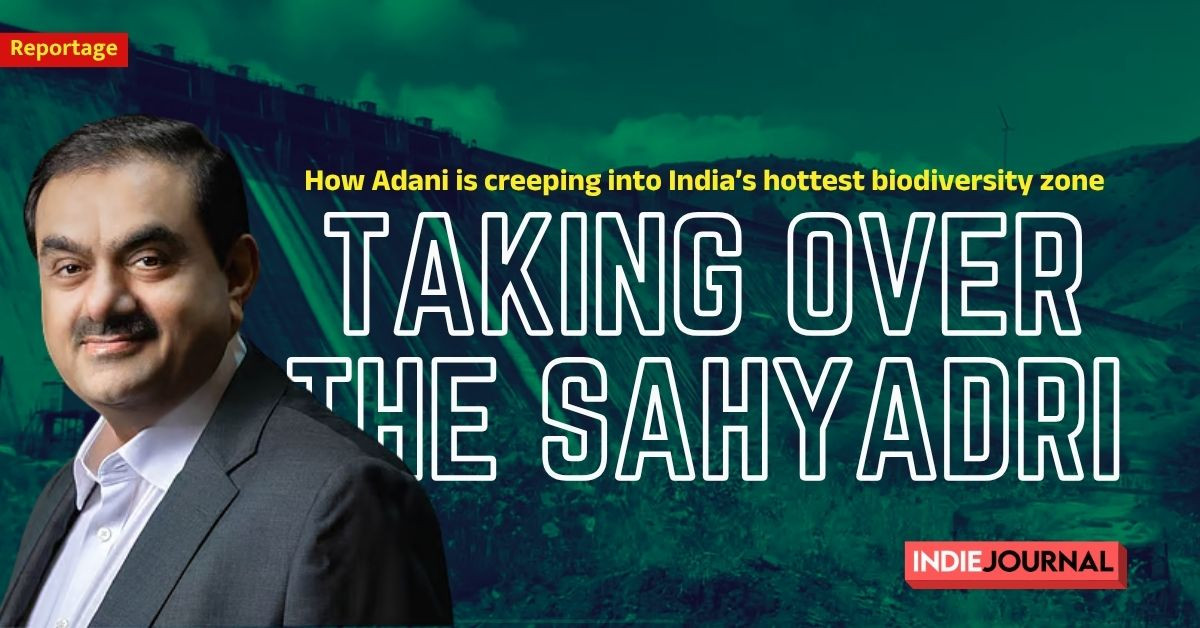
Satyawan Jadhav, a farmer in Kalambe village in Satara’s Patan taluka, was busy working in his field when he got to know that construction has begun at a land uphill he owns collectively with many farmers in the village. He rushed there with a few other villagers and managed to stop the work, carried out by Adani Green Energy Pvt Ltd for the construction of a pumped storage project over the Tarali Dam. One of the farmers in the region opposing this project, he had no idea that the project had received permission to go ahead.
“They went behind our backs,” Jadhav said.
Farmers in Satara have alleged that the Adani Green Energy Pvt Ltd has illegally acquired their lands to begin the construction of their already controversial Tarali Pumped Storage Project (PSP), without acquiring due permission from the district and local administration. While the villagers in the upper dam region have said that their collective agricultural lands have been grabbed by an agent company to start work for Adani’s project, the villages around lower dam have said that the company has been using their commuter road without any permissions, rendering it damaged and dangerous for the locals to use.
“They took our lands without our knowledge while we were busy with work in our fields. We came here after Dasara to find that parts of our collective lands have been taken without asking us. We tried to stop the work, but the contractors here say that the work is going on over private land. In reality, very few people have actually given them the land. The rest has been taken without informing all original owners,” says Vijay Jadhav, a resident of Kalambe, one of the villages that are going to be affected by the upper dam that will be built as part of the PSP.
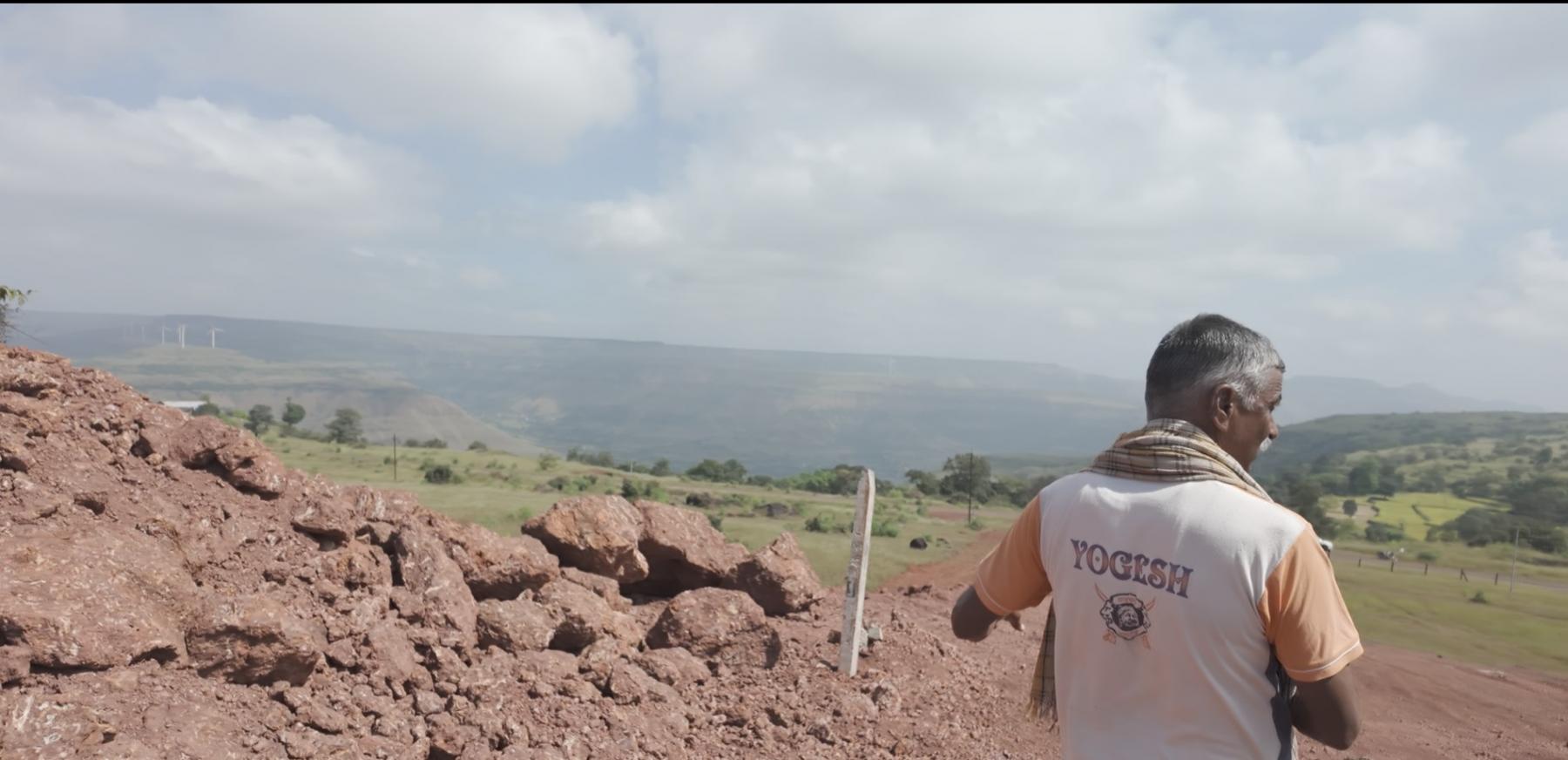
The Tarali PSP is one of the several pumped storage projects that the Adani Green Energy Pvt Ltd has planned across the Western Ghats in Maharashtra. It is a proposed 1,500 MW pumped hydro project in Satara district’s Patan taluka which will utilise the existing dam as a lower reservoir and build a new upper reservoir. The project has been in controversy since it was approved last year, as the villagers fear the project will affect their water supply and safety.
“The PSP is going to affect four villages in the region. Tondoshi and Nivade in the lower dam region and Kalambe and Dafalwadi in the upper reservoir region,” says Balasaheb Sapkal, one of the villagers in the region who has been actively protesting the PSP. It is interesting to note here that Tondoshi and Nivade are already dam-affected villages. They were rehabilitated when the original dam was built a couple of decades ago.
“These are already dam-affected villages. And now they again have to face this new project,” says Dr Bharat Patankar, leader of Shramik Mukti Dal, who has been supporting the villagers in the region since the construction of Tarali Dam. However, the villagers in Tondoshi recall that the process of land acquisition and rehabilitation during the construction of the original dam was more informed.
“We had several meetings with the authorities at the time. Dr Patankar and others in the Shramik Mukti Dal intervened and made sure the meetings took place. We were all rehabilitated. Even if a farmer lost one Guntha land, he was rehabilitated and given a plot of farmland, or he at least got employment allowance,” recounts Balasaheb Mane, a resident of Tondoshi village.

However, he adds, no such procedures were followed while starting the construction work for the PSP by the Adani Group.
“They did not ask the villagers anything. No one was consulted,” says Aananda Mane, another resident of Tondoshi.
The villagers say that they were particularly appalled by the way the land is being acquired for the PSP. They have alleged that the company appointed by the Adani Group has acquired parts of the collective land without informing all the owners.
“This is ancestral land. It was owned by our great grandfathers and then it was passed down to their children and the generations that followed. The land ownership was not formally divided on paper amid all the children, thus all the land belongs to everyone. There are no lines dividing the land between each of the brothers,” says Vijay Jadhav.
“They left the rocky patch of the land for us and acquired the agricultural land."
However, the villagers allege that the company has bought parts of the said land from a few owners, without asking the others.
“Some of the owners of the collective land sold their part. However, they did not say that this particular part of the land was theirs. But the company did not take into account the other owners of the land and just picked the part of the land suitable to them. It is completely illegal that the company did not ask the other owners,” Jadhav added.
“They left the rocky patch of the land for us and acquired the agricultural land. And moreover, we had no idea that they even started the work. We even found out about this around eight to 10 days after the construction began,” says Satyawan Jadhav, one of the owners of the collective land in Kalambe where the construction for the PSP has begun.
Land acquisition for any such projects in India is regulated by the Right to Fair Compensation and Transparency in Land Acquisition, Rehabilitation and. Resettlement Act, 2013. “The act warrants that the land acquisition is carried out with transparency and against the right value. However, the company that is acquiring the land for the PSP is not following any such rules,” Sapkal says.
The people of Kalambe have also alleged that the company has illegally started construction of a road for the project on the land donated by the villagers to Gagangiri Maharaj Math, a charitable trust, in the 1990s.
“In around 1992-93, all the villagers came together to donate 43 acres of land to the Gagangiri Maharaj Math Trust for developing the village socio-economically. We expected them to start a school, hospital, local industry, etc. All they have done over all these years is start a school. And now we find out that the land that we donated back then is now being used for Adani Group’s project,” says Ram Jadhav, another resident of Kalambe who is active in the protest against the PSP.
The villagers have complained that the work has been started without consultation with the villagers as well as without any permissions from any of the local authorities.
“The Tarali PSP site was not part of the projects originally approved by the Central Government."
“They just come here one fine day and start the work. We have stopped their work thrice in the last couple of months. They just come back the next day and resume,” Vijay Jadhav says.
Lack of proper procedure
Not just the villagers but even the experts and activists have pointed out that there have been many irregularities in this project right from the beginning.
“The Tarali PSP site was not part of the projects originally approved by the Central Government. It was sanctioned by the Krishna River Management Board. Why was that done, we have no answers. Further, we can see that the work for the PSP has begun on two sites, at the upper side of the dam and around the lower dam. Now the work near the lower dam is directly damaging the road that the villagers on the other side of the dam use to commute daily. The huge construction vehicles are always on the road, it is also covered in rubble. By law, they cannot use the road like this. And they have been using this road without any permission from the authorities,” says Dr Patankar.
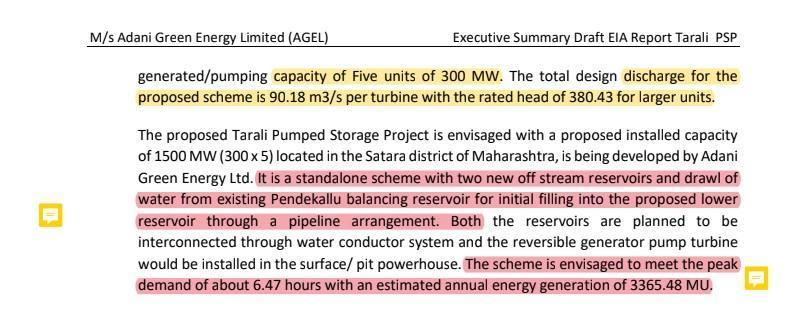
Patankar, along with other activists, have been holding meetings with the District Magistrate demanding that the work on the lower site should be halted due to the lack of permission. While he received the said permission last week, he hopes that the work actually remains halted.
However, the issue with the irregularities in the procedure did not begin with the construction. Last year, controversy arose when the Environmental Impact Assessment (EIA) report that the Adani Green Energy Pvt Ltd had submitted last year was found to be copy-pasted from another report and “full of inaccuracies” as per experts who examined its summary provided to the public. The experts and the people had demanded that the public hearing be postponed due to this. However, the authorities and the company did not listen to this demand.
Villagers fear for water supply and agriculture
The agriculture in the area is dependent on the water from the dam as well as the numerous aquifers that emerge from the Sahyadri Hills. The villagers have expressed fears that the blasting that will be conducted in the hills for tunnelling work might block the aquifers and stop water supply.
“The water that flows from these streams ensures a perennial supply of drinking as well as agricultural water for us. The tunnelling and other construction that the Adani Group has planned is right in the stream’s path. What should we do if our water flow stops once the project starts,” questions Aananda Mane.
Further, the water from the dam has already been distributed to the nearby villages to meet their drinking water and irrigation needs.
The PSP will require the dam to increase its dead storage.
“All the villages around the dam either receive or are supposed to receive water from this dam. The water goes upto the drought prone Maan and Khatav talukas in Satara district. So all this water has already been assigned. So which water will Adani take and where? We tried to ask them about it, but they did not give us any answers. All the irrigation schemes in this region depend on this dam. It is going to irrigate an area of around 27,000 hectares of land. What about all that?” Pradeep Nikam from Indoli village downstream, who is a part of the protest against the PSP, questions.
While the PSPs often claim that they are only circulating whatever water is already in the dam and not diverting any water elsewhere, experts have said that the fears of the farmers are quite well-founded.
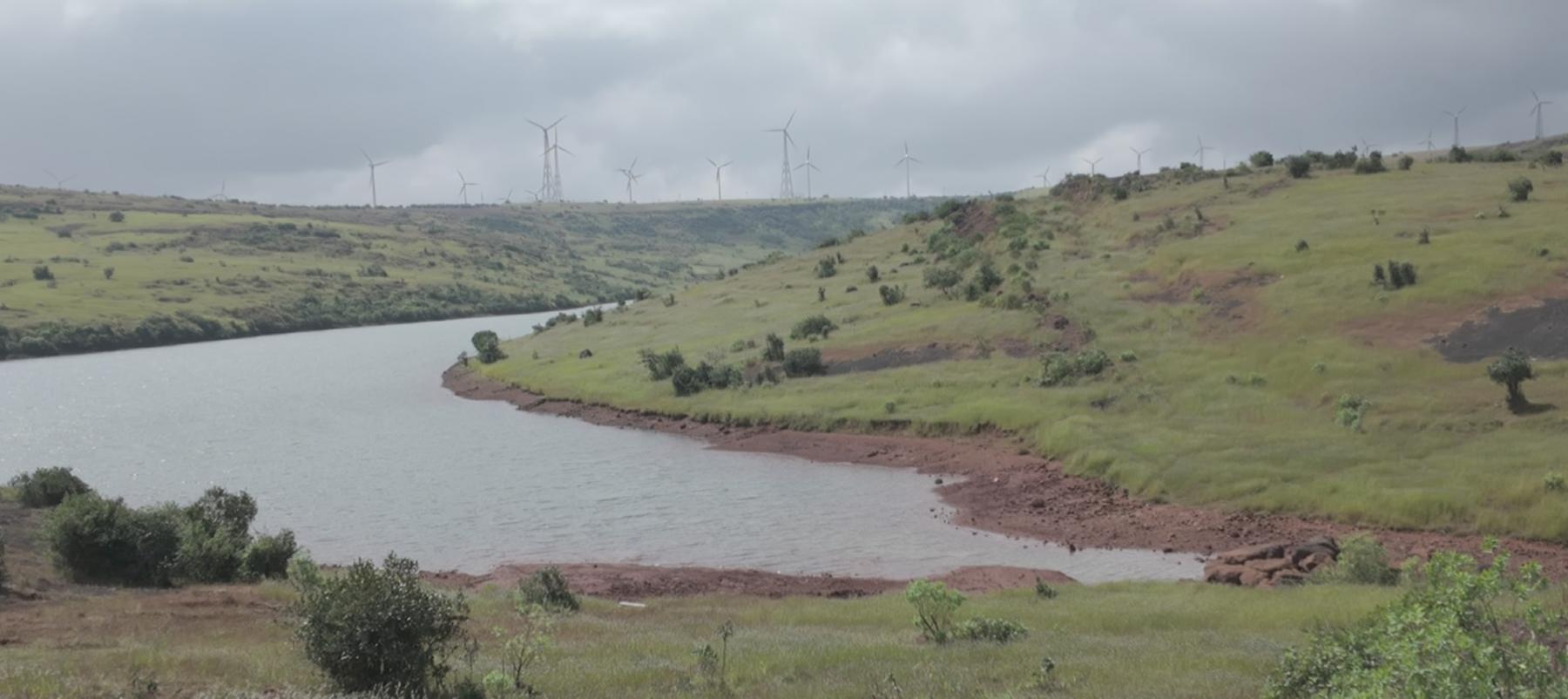
“It’s easy to say that we will not actually use the water. But since they have to keep the water circulating for the PSP to work, it is clear that a particular amount of water would be reserved for it. Thus that water will not be available for irrigation. They have not explained the calculations for this in the EIA report, nor did they answer our questions about it during the public hearing. Right now, the dam has enough water as the monsoon season is just over. But as we move towards summer, the real question will arise. Will they keep the water reserved for the PSP or will they provide it for agriculture?” Shripad Dharmadhikary, Policy Researcher at Manthan Adhyana Kendra, who was instrumental in revealing the inaccuracies of the EIA summary, points out.
Further, he also says that the PSP will require the dam to increase its dead storage.
“Dead storage refers to the minimum level of water that we must maintain in the dam. The PSP will need a larger quantity of water to be kept stored in the dam all the time. It will raise the draw-down level of the dam, which means more water will not be available for drinking or irrigation, especially in the summer months. Further, as draw down level increases, the land that gets exposed in the winter and summer months when water levels drop decreases. This land is often used for farming in the non-monsoon months. That land will not be available for farmers anymore,” he adds.
Environmental impacts
The Sahyadri Tiger Reserve is within 10 kms of the Tarali PSP site. The Radhanagari Wildlife Sanctuary is at a distance of around 50 kms. The region around the PSP site often acts as a corridor for the wildlife in the region. The villagers fear that the construction activity might lead to more cases of human-animal conflict in the region.
Madhav Gadgil had recommended classifying the entire region as an ecologically sensitive region.
“There are Gaurs, Leopards in these forests. We have already started facing human animal conflict in our villages. These mountains act as corridors for the migration of wild animals. Any projects coming up in the Sahyadris will act as a barrier in the middle of this corridor and we are afraid that the conflict will increase further,” Nikam said.
The Western Ghats are ecologically a volatile region. In 2011, the Western Ghats Ecology Expert Panel under ecologist Madhav Gadgil had recommended classifying the entire region as an ecologically sensitive region. However, the recommendations were never implemented and several projects continue to be planned and constructed across the Western Ghats.
“Our village, Kalambe, has been cautioned as a landslide-prone village. Every monsoon, several families in the village are shifted from their homes to the nearby school as their houses are at risk. Now they want to blast parts of these very mountains that are susceptible to landslides to make tunnels for the project. What if this ends up destroying our village completely,” asks Ram Jadhav.
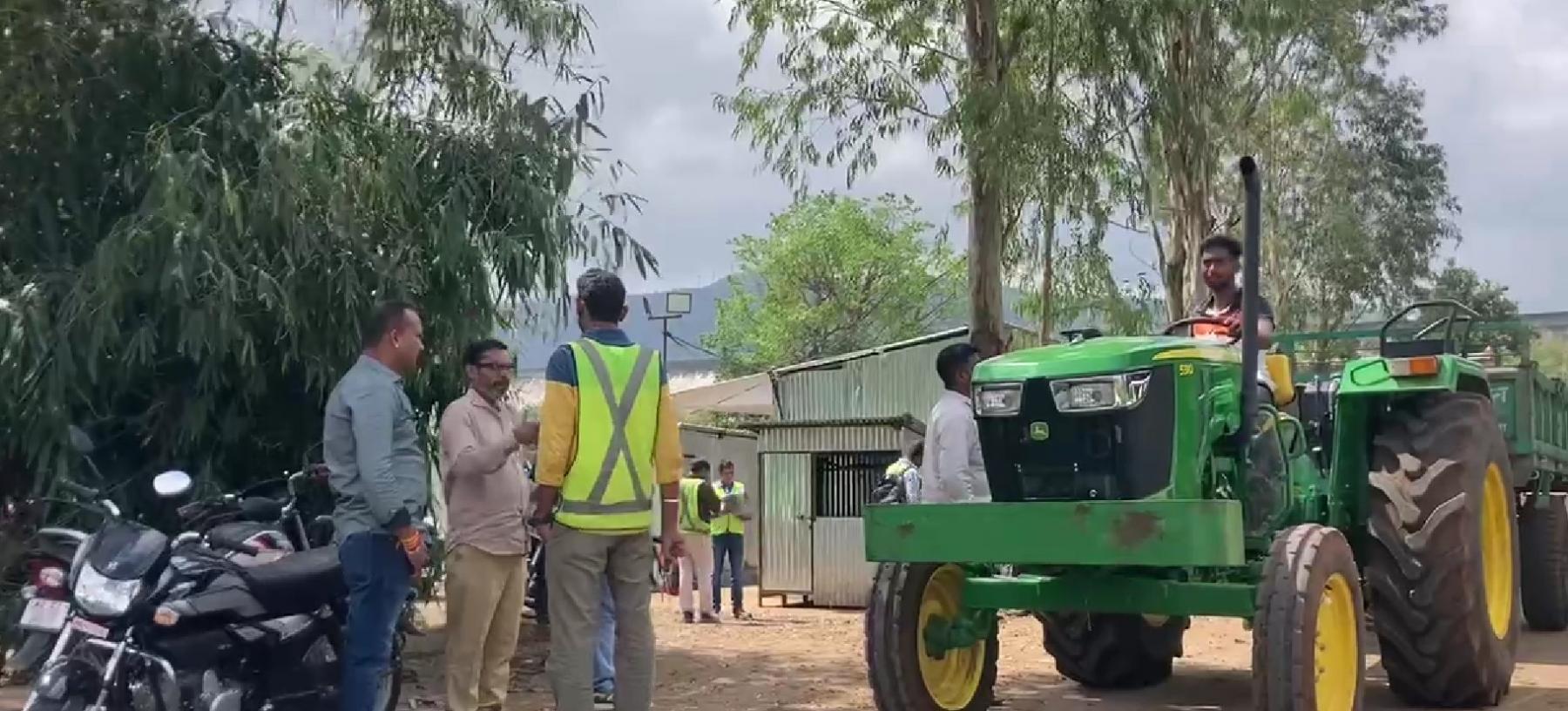
Dharmadhikary says that the villagers are right to be afraid as they had experienced some damage to their houses when blasting was done for the Tarali Dam.
“There needs to be a detailed and cumulative study of all these aspects before any project is approved. But there is no evidence that all these factors were studied at all in the environmental assessment,” Dharmadhikary says.
The Maharashtra Government has signed several MoUs for the construction of pumped storage projects across the Western Ghats. Many of these will be developed by the Adani Group, while other big players in the sector like Greenco, Torrent Power are also developing a few of them.
“The number of PSPs coming up in the Western Ghats is concerning. What’s more concerning is that there is no study about the cumulative impact of all these projects on the Sahyadris and the surrounding region. And along with the construction directly related to the projects, they also bring other infrastructural interventions like roads with them. All of this needs to be studied and explained to the people. Neither the company nor the government is ready to do that,” Dharmadhikary says.
Indie Journal tried to contact the officials of Adani Green Energy Pvt Ltd at the site office near Tarali Dam, but the officials on site refused to comment over any queries. An email has been sent to the official email ID of the Adani Green Energy Pvt Ltd. The story will be updated once they respond to it.






